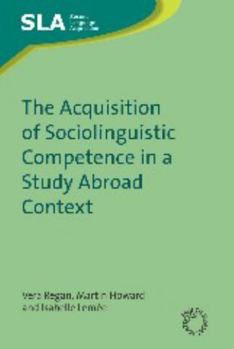The Acquisition of Sociolinguistic Competence in a Study Abroad Context
(Part of the Second Language Acquisition Series)
Select Format
Select Condition 
Book Overview
This volume explores the relationship between 'study abroad' and the acquisition of 'sociolinguistic competence' - the ability to communicate in socially appropriate ways. The volume looks at language development and use during study abroad in France by examining patterns of variation in the speech of advanced L2 speakers. Within a variationist paradigm, fine-grained empirical analyses of speech illuminate choices the L2 speaker makes in relation to their new identity, gender patterns, closeness or distance maintained in the social context in which they find themselves. Using both cross-sectional and longitudinal data, four variable features of contemporary spoken French are analysed in a large population of advanced Irish-English speakers of French. This close-up picture provides empirical evidence by which to evaluate the wide-spread assumption that Study Abroad is highly beneficial for second language learning.
Related Subjects
Language Arts




